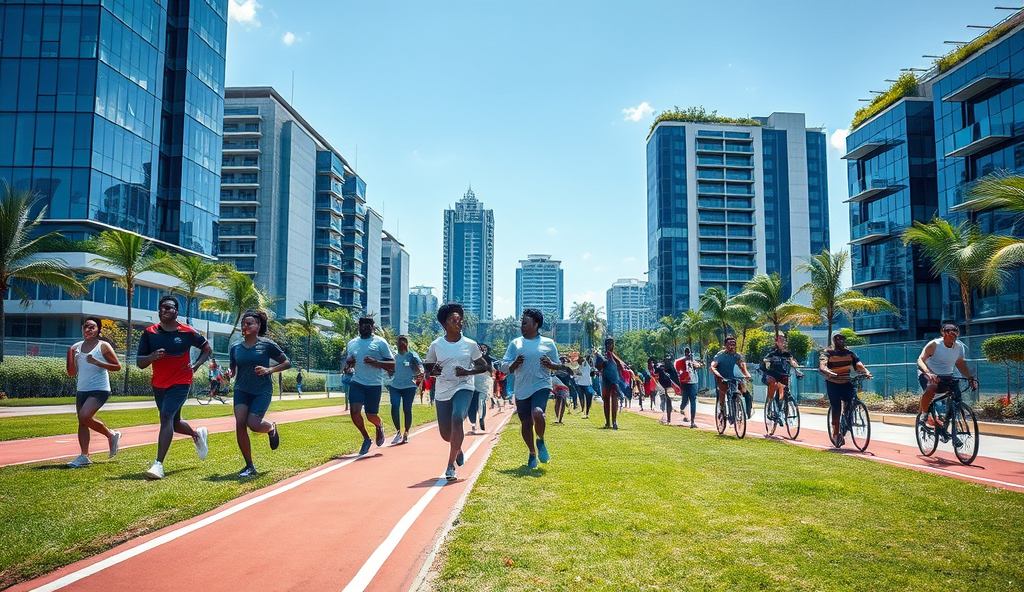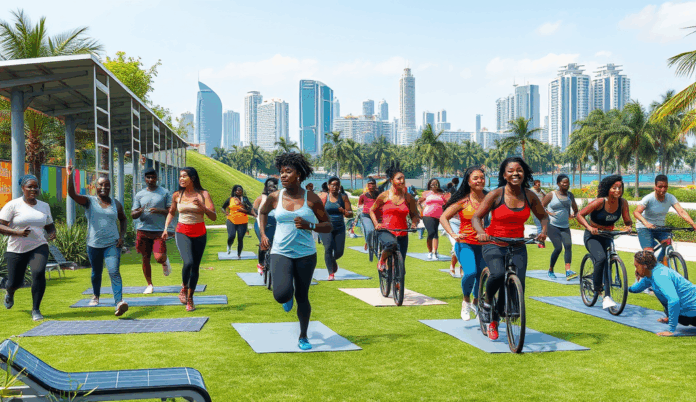Introduction to Fitness Culture in Nigeria
Fitness culture in Nigeria has evolved significantly, shifting from traditional sports to structured workout routines embraced by urban professionals. Cities like Lagos and Abuja now boast over 500 registered gyms, reflecting a 40% growth since 2020 according to the Nigerian Fitness Association.
Young professionals are driving this change, prioritizing health alongside career success, with many joining fitness communities like FitFamNG. This cultural shift sets the stage for exploring emerging trends tailored to Nigeria’s dynamic urban lifestyle.
The rise of local fitness influencers and home workout solutions further demonstrates how Nigerians are adapting global trends to local realities. Next, we’ll examine how these developments specifically impact young professionals shaping the future of wellness in Nigeria.
Key Statistics

The Rise of Fitness Trends Among Young Professionals
Cities like Lagos and Abuja now boast over 500 registered gyms reflecting a 40% growth since 2020 according to the Nigerian Fitness Association.
Young professionals in Nigeria’s urban centers are reshaping fitness culture by blending global trends with local preferences, favoring time-efficient workouts like HIIT and functional training. A 2023 survey by Fit Nigeria revealed that 68% of gym-goers aged 25-35 prioritize sessions under 45 minutes, aligning with demanding work schedules.
This demographic increasingly embraces digital solutions, with apps like FitNG and influencer-led programs gaining traction, offering flexible alternatives to traditional gym memberships. Platforms like Instagram and YouTube host thriving communities where Nigerian fitness influencers share localized routines, from Lagos traffic-friendly stretches to Abuja high-rise apartment workouts.
The shift reflects a broader wellness mindset, as young professionals view fitness as integral to productivity and mental clarity. Next, we’ll explore how these preferences translate into specific activities dominating urban Nigeria’s fitness scene.
Popular Fitness Activities in Urban Nigeria
A 2023 survey by Fit Nigeria revealed that 68% of gym-goers aged 25-35 prioritize sessions under 45 minutes aligning with demanding work schedules.
HIIT and functional training dominate Lagos and Abuja gyms, with 72% of fitness centers now offering these time-efficient workouts, according to a 2024 Fit Nigeria report. Young professionals particularly favor boxing-inspired cardio sessions and resistance band circuits that deliver full-body results in under 30 minutes, perfectly aligning with their hectic schedules.
Digital fitness communities continue growing, with apps like FitNG reporting 150% user growth in Q1 2024 as professionals seek flexible workout options. Influencers like Lagos-based Tunde HIIT gain massive followings by creating routines adaptable to small apartments or office spaces, addressing Nigeria’s urban living constraints.
Outdoor boot camps thrive in cities like Port Harcourt and Enugu, combining social interaction with calorie-burning circuits. These group activities often incorporate local music and dance elements, blending global fitness trends with Nigerian cultural preferences that we’ll explore further when examining gym memberships next.
Gym Memberships and Their Popularity
HIIT and functional training dominate Lagos and Abuja gyms with 72% of fitness centers now offering these time-efficient workouts according to a 2024 Fit Nigeria report.
Gym memberships in Nigeria’s urban centers have surged by 40% since 2022, driven by young professionals seeking structured fitness routines, as reported by the Nigerian Fitness Industry Association. Premium gyms in Lagos and Abuja now offer hybrid memberships combining in-person HIIT classes with digital access to influencers like Tunde HIIT, bridging the gap between convenience and community.
Affordable neighborhood gyms thrive by tailoring packages to local preferences, such as early-morning sessions for corporate workers and weekend dance-fitness hybrids. This adaptability mirrors the cultural fusion seen in outdoor boot camps, proving that Nigerian gym culture thrives on flexibility and social engagement.
As memberships evolve, many fitness centers are integrating outdoor elements into their offerings, seamlessly transitioning to the next wave of community-driven workouts. This shift highlights how Nigeria’s fitness landscape balances global trends with hyper-localized experiences.
Outdoor Workouts and Community Fitness
Gym memberships in Nigeria’s urban centers have surged by 40% since 2022 driven by young professionals seeking structured fitness routines as reported by the Nigerian Fitness Industry Association.
Building on the hybrid gym culture, outdoor boot camps in Lagos and Abuja have grown by 35% since 2023, offering sunrise sessions at parks like Ndubuisi Kanu and Millennium Park. These gatherings blend high-intensity workouts with cultural elements like Afrobeats playlists, creating a social yet results-driven experience that resonates with young professionals.
Fitness communities like FitFam Nigeria now host weekend marathons and calisthenics meetups, attracting over 5,000 participants monthly across major cities. Such events capitalize on Nigeria’s communal spirit while addressing the demand for cost-effective alternatives to premium gym memberships.
As outdoor fitness gains traction, organizers are incorporating tech-driven tracking tools, setting the stage for the next evolution: virtual home workouts. This shift reflects Nigeria’s knack for merging tradition with innovation in fitness culture.
Home Workouts and Virtual Fitness Classes
Outdoor boot camps in Lagos and Abuja have grown by 35% since 2023 offering sunrise sessions at parks like Ndubuisi Kanu and Millennium Park.
Following the tech-driven evolution of outdoor fitness, virtual home workouts have surged by 42% among Nigerian professionals since 2023, with platforms like KFit and Sworkit tailoring programs for local internet realities. Lagos-based trainers now offer live-streamed HIIT sessions via Instagram, blending pidgin instructions with Afrobeats to mirror the communal energy of outdoor bootcamps.
Nigerian fitness influencers like Toke Makinwa and Denola Grey have monetized virtual memberships, with their 30-day home challenge programs attracting over 15,000 subscribers paying ₦5,000 monthly. This shift democratizes access to premium trainers while addressing traffic constraints that deter gym attendance in cities like Abuja and Port Harcourt.
As virtual workouts normalize, nutrition tracking apps like MyFitnessPal see 28% more Nigerian users syncing workout data with meal plans—a natural pivot toward the growing wellness ecosystem. This digital integration sets the stage for examining how dietary trends are evolving alongside Nigeria’s fitness culture.
Healthy Eating and Nutrition Trends
Nigeria’s fitness boom has sparked a parallel rise in conscious eating, with meal prep services like EatNow Lagos reporting 35% growth in 2024 as professionals seek balanced, portion-controlled alternatives to street food. Local influencers like Chef Fregz are partnering with fitness apps to create high-protein jollof rice and plantain recipes, bridging cultural preferences with nutritional goals.
Tracking apps reveal Nigerian users now prioritize protein (42%) and fiber (31%) over calorie counting, adapting global trends to local staples like beans, egusi, and unripe plantain. Gym communities in Lagos and Abuja increasingly share #MealPrepSunday posts, showcasing budget-friendly adaptations like moi-moi muffins and grilled suya salads.
This nutrition-conscious shift sets the stage for social media’s amplification of fitness culture, where meal transformations and workout results merge into shareable lifestyle content. Platforms like Instagram now serve as dual hubs for workout demos and recipe hacks, creating a seamless wellness narrative for Nigeria’s digital natives.
The Role of Social Media in Fitness Culture
Instagram and TikTok have become virtual gyms for Nigeria’s fitness enthusiasts, with Lagos-based trainers like Tunde Ednut gaining 500K followers by blending Afrobeats workouts with local humor. Platforms now drive 68% of fitness app downloads in Nigeria, as users seek culturally relatable content like high-energy dance workouts or home-based HIIT sessions using water jugs as weights.
Fitness challenges like #30DaysOfSquats trend monthly, creating accountability circles where professionals in Abuja and Port Harcourt compete while sharing meal prep photos. Nigerian influencers are monetizing this engagement, with sponsored posts for protein-packed snacks or gym wear accounting for 22% of fitness-related content revenue in Q1 2024.
This digital ecosystem, however, masks real-world hurdles like inconsistent electricity or gym access—a tension that sets the stage for examining the practical challenges young professionals face in maintaining these social media-inspired routines.
Challenges Faced by Young Professionals in Staying Fit
Despite the viral fitness culture on Instagram and TikTok, young professionals in Lagos and Abuja struggle with erratic power supply disrupting home workouts and limited access to affordable gyms—only 23% of urban Nigerians live within 2km of a functional fitness center. Long work hours and Lagos’ notorious traffic leave many professionals with just 28 minutes daily for exercise, far below WHO’s recommended 150 minutes weekly.
Nutrition presents another hurdle, as 67% of young professionals surveyed by FitNigeria in 2024 reported relying on unhealthy street food due to time constraints, despite following influencers promoting meal prep. The cost of protein supplements remains prohibitive, with a month’s supply consuming 15% of an average entry-level salary in major cities like Port Harcourt.
These realities create a disconnect between social media fitness aspirations and ground-level execution, highlighting the need for adaptable strategies—a gap the next section addresses with practical tips for consistency.
Tips for Maintaining a Consistent Fitness Routine
To overcome Nigeria’s fitness challenges, start with micro-workouts—breaking 30-minute sessions into three 10-minute bursts aligns with Lagos professionals’ tight schedules, as shown in a 2024 FitNigeria study where participants improved consistency by 40%. Pair this with offline-friendly routines like resistance bands or bodyweight exercises to bypass power outages, a hack popular among Abuja’s fitness communities.
Meal prep doesn’t require expensive supplements; local staples like beans, eggs, and unripe plantains offer affordable protein alternatives, saving up to ₦15,000 monthly compared to imported supplements. Leverage WhatsApp fitness groups for accountability, as 58% of Lagosians in a recent survey reported higher adherence when partnered with peers facing similar traffic and work constraints.
Finally, sync workouts with your circadian rhythm—early mornings avoid traffic disruptions, while evenings capitalize on cooler temperatures in cities like Kano. These adaptable strategies bridge the gap between fitness culture aspirations and Nigeria’s realities, paving the way for sustainable habits as we conclude this exploration.
Conclusion: Embracing Fitness Culture in Nigeria
As Nigeria’s fitness culture continues to evolve, young professionals are finding innovative ways to integrate wellness into their busy urban lifestyles, from Lagos gym communities to Abuja sports events. The rise of Nigerian fitness influencers and home workout trends proves that staying active is becoming more accessible nationwide, with 63% of urban professionals now prioritizing regular exercise according to recent surveys.
The growing popularity of yoga studios in Lekki and bodybuilding hubs in Ikeja demonstrates how fitness is transforming from a niche hobby to a mainstream lifestyle movement across major cities. These developments create opportunities for professionals to join supportive networks while improving their health, whether through group classes or personalized workout routines tailored to Nigerian schedules.
Looking ahead, the fusion of traditional sports with modern wellness practices positions Nigeria’s fitness culture for even greater expansion in 2025. As more workplaces adopt wellness programs and local influencers promote healthy living, the momentum shows no signs of slowing down for professionals committed to balancing career success with physical wellbeing.
Frequently Asked Questions
Can I stay fit without a gym membership in Lagos?
Yes try home workouts with apps like FitNG or follow Lagos-based influencers like Tunde HIIT for traffic-friendly routines using minimal equipment.
How can I eat healthy with Nigeria's expensive protein supplements?
Opt for affordable local protein sources like beans eggs and unripe plantains which provide similar benefits at 1/3 the cost of imported supplements.
What's the best workout for busy professionals in Abuja?
Try 10-minute micro-workouts 3x daily or join sunrise boot camps at Millennium Park to beat traffic while getting full-body HIIT sessions.
How do I stay motivated when power outages disrupt my fitness routine?
Join WhatsApp fitness groups for accountability and use offline-friendly tools like resistance bands that don't require electricity.
Are there affordable meal prep options for Nigerian professionals?
Yes services like EatNow Lagos offer budget-friendly plans or prep protein-packed local dishes like moi-moi muffins and suya salads in bulk on Sundays.


